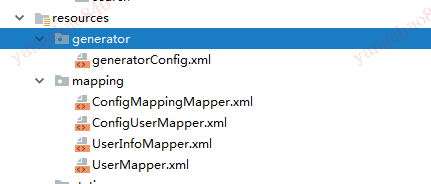一、应用场景
1.分页,如com.github.pagehelper的分页插件实现;
2.拦截sql做日志监控;
3.统一对某些sql进行统一条件拼接,类似于分页。
二、MyBatis的拦截器简介
然后我们要知道拦截器拦截什么样的对象,拦截对象的什么行为,什么时候拦截?
在Mybatis框架中,已经给我们提供了拦截器接口,防止我们改动源码来添加行为实现拦截。说到拦截器,不得不提一下,拦截器是通过动态代理对Mybatis加入一些自己的行为。
拦截对象
确立拦截对象范围:要拦对人,既要保证拦对人,又要保证对正确的人执行正确的拦截动作
拦截地点
在Mybatis的源码中
拦截时机
如果mybatis为我们提供了拦截的功能,我们应该在Mybatis执行过程的哪一步拦截更加合适呢?
拦截某个对象干某件事的时候,拦截的时机要对,过早的拦截会耽误别人做自己的工作,拦截太晚达不到目的。
Mybatis实际也是一个JDBC执行的过程,只不过被包装起来了而已,我们要拦截Mybatis的执行,最迟也要在获取PreparedStatement时拦截:
PreparedStatementstatement=conn.prepareStatement(sql.toString());
在此处偷偷的将sql语句换掉,就可以改变mybatis的执行,加入自己想要的执行行为。
而获取Mybatis的Statement是在StatementHandler中进行的。
三、代码示例
第一步、引入依赖
<dependency>
<groupId>org.mybatis.spring.boot</groupId>
<artifactId>mybatis-spring-boot-starter</artifactId>
<version>1.3.2</version>
</dependency>第二步、配置application.propertities,指定好好映射文件和实体类的目录
### mybatis
mybatis.mapperLocations: classpath:mapping/*.xml
###classpath就是应用程序resources的路径
mybatis.type-aliases-package: com.pingan.yc.demo.model第三步、配置代码生成器,引入配置在pom中添加一下代码
<build>
<plugins>
<plugin>
<groupId>org.apache.maven.plugins</groupId>
<artifactId>maven-compiler-plugin</artifactId>
<configuration>
<source>1.8</source>
<target>1.8</target>
</configuration>
</plugin>
<!--<plugin>
<groupId>org.apache.maven.plugins</groupId>
<artifactId>maven-resources-plugin</artifactId>
<configuration>
<encoding>${encoding}</encoding>
</configuration>
</plugin>-->
<plugin>
<groupId>org.springframework.boot</groupId>
<artifactId>spring-boot-maven-plugin</artifactId>
</plugin>
<!-- mybatis generator 自动生成代码插件 -->
<plugin>
<groupId>org.mybatis.generator</groupId>
<artifactId>mybatis-generator-maven-plugin</artifactId>
<version>1.3.2</version>
<configuration>
<!-- 自动生成代码的配置文件地址 -->
<configurationFile>${basedir}/src/main/resources/generator/generatorConfig.xml</configurationFile>
<verbose>true</verbose>
<overwrite>true</overwrite>
</configuration>
</plugin>
</plugins>
</build>在resource文件夹下新建generator.xml文件

内容如下:需要注意配置数据库连接驱动和数据库连接,指定生成实体类和映射文件的路径,最后按格式配置要生成的数据表
<?xml version="1.0" encoding="UTF-8"?>
<!DOCTYPE generatorConfiguration
PUBLIC "-//mybatis.org//DTD MyBatis Generator Configuration 1.0//EN"
"http://mybatis.org/dtd/mybatis-generator-config_1_0.dtd">
<generatorConfiguration>
<!-- 数据库驱动:选择你的本地硬盘上面的数据库驱动包-->
<classPathEntry location="D:\Users\admin\.m2\repository\mysql\mysql-connector-java\5.1.46\mysql-connector-java-5.1.46.jar"/>
<context id="DB2Tables" targetRuntime="MyBatis3">
<commentGenerator>
<property name="suppressDate" value="true"/>
<!-- 是否去除自动生成的注释 true:是 : false:否 -->
<property name="suppressAllComments" value="true"/>
</commentGenerator>
<!--数据库链接URL,用户名、密码 -->
<jdbcConnection driverClass="com.mysql.jdbc.Driver" connectionURL="jdbc:mysql://localhost:4433/standard_policy_db" userId="dev" password="dev">
</jdbcConnection>
<javaTypeResolver>
<property name="forceBigDecimals" value="false"/>
</javaTypeResolver>
<!-- 生成模型的包名和位置-->
<javaModelGenerator targetPackage="com.pingan.yc.policy.model" targetProject="src/main/java">
<property name="enableSubPackages" value="true"/>
<property name="trimStrings" value="true"/>
</javaModelGenerator>
<!-- 生成映射文件的包名和位置-->
<sqlMapGenerator targetPackage="mapping" targetProject="src/main/resources">
<property name="enableSubPackages" value="true"/>
</sqlMapGenerator>
<!-- 生成DAO的包名和位置-->
<javaClientGenerator type="XMLMAPPER" targetPackage="com.pingan.yc.policy.dao" targetProject="src/main/java">
<property name="enableSubPackages" value="true"/>
</javaClientGenerator>
<!-- 要生成的表 tableName是数据库中的表名或视图名 domainObjectName是实体类名-->
<table tableName="t_user_yc" domainObjectName="User" enableCountByExample="false" enableUpdateByExample="false" enableDeleteByExample="false" />
<table tableName="t_userinfo_yc" domainObjectName="UserInfo" enableCountByExample="false" enableUpdateByExample="false" enableDeleteByExample="false" selectByExampleQueryId="true"/>
</context>
</generatorConfiguration>
最后:在maven命令窗口或如下界面中执行mybatis-generator:generate命令

最后生成如下文件:

第四步、拦截器
(生成对应文件后,mybatis环境算是集成好了,可以运行一个测试类试试能否从数据库读取数据。)
定义一个类实现Mybatis的Interceptor接口,@Component注解必须要添加,不然可能出现拦截器无效的情况!!!
import org.apache.ibatis.executor.statement.StatementHandler;
import org.apache.ibatis.mapping.BoundSql;
import org.apache.ibatis.mapping.MappedStatement;
import org.apache.ibatis.plugin.*;
import org.apache.ibatis.reflection.DefaultReflectorFactory;
import org.apache.ibatis.reflection.MetaObject;
import org.apache.ibatis.reflection.SystemMetaObject;
import org.springframework.stereotype.Component;
import java.lang.reflect.Field;
import java.lang.reflect.Method;
import java.sql.Connection;
import java.util.Properties;
@Component
@Intercepts({
@Signature(
type = StatementHandler.class, method = "prepare", args = {Connection.class, Integer.class
})
})
public class MySqlInterceptor implements Interceptor {
@Override
public Object intercept(Invocation invocation) throws Throwable {
// 方法一
StatementHandler statementHandler = (StatementHandler) invocation.getTarget();
MetaObject metaObject = MetaObject.forObject(statementHandler, SystemMetaObject.DEFAULT_OBJECT_FACTORY, SystemMetaObject.DEFAULT_OBJECT_WRAPPER_FACTORY, new DefaultReflectorFactory());
//先拦截到RoutingStatementHandler,里面有个StatementHandler类型的delegate变量,其实现类是BaseStatementHandler,然后就到BaseStatementHandler的成员变量mappedStatement
MappedStatement mappedStatement = (MappedStatement) metaObject.getValue("delegate.mappedStatement");
//id为执行的mapper方法的全路径名,如com.uv.dao.UserMapper.insertUser
String id = mappedStatement.getId();
//sql语句类型 select、delete、insert、update
String sqlCommandType = mappedStatement.getSqlCommandType().toString();
BoundSql boundSql = statementHandler.getBoundSql();
//获取到原始sql语句
String sql = boundSql.getSql();
String mSql = sql;
//TODO 修改位置
//注解逻辑判断 添加注解了才拦截
Class<?> classType = Class.forName(mappedStatement.getId().substring(0, mappedStatement.getId().lastIndexOf(".")));
String mName = mappedStatement.getId().substring(mappedStatement.getId().lastIndexOf(".") + 1, mappedStatement.getId().length());
for (Method method : classType.getDeclaredMethods()) {
if (method.isAnnotationPresent(InterceptAnnotation.class) && mName.equals(method.getName())) {
InterceptAnnotation interceptorAnnotation = method.getAnnotation(InterceptAnnotation.class);
if (interceptorAnnotation.flag()) {
mSql = sql + " limit 2";
}
}
}
//通过反射修改sql语句
Field field = boundSql.getClass().getDeclaredField("sql");
field.setAccessible(true);
field.set(boundSql, mSql);
return invocation.proceed();
}
@Override
public Object plugin(Object target) {
if (target instanceof StatementHandler) {
return Plugin.wrap(target, this);
} else {
return target;
}
}
@Override
public void setProperties(Properties properties) {
}
}此外,定义了一个方法层面的注解,实现局部指定拦截
@Target({ElementType.METHOD,ElementType.PARAMETER})
@Retention(RetentionPolicy.RUNTIME)
public @interface InterceptAnnotation {
boolean flag() default true;
}最后只需要在指定的方法出添加注解就可以实现局部拦截

最后运行看结果就好了。(按我的逻辑下来会只查到2条数据)
在@Interceptor的注解中也有以下的注解方式,究竟有什么不同和差异,请大家自己研究咯,我就在此抛砖引玉了,请各位大牛指导了。
@Intercepts(value = {
@Signature(type = Executor.class,
method = "update",
args = {MappedStatement.class, Object.class}),
@Signature(type = Executor.class,
method = "query",
args = {MappedStatement.class, Object.class, RowBounds.class, ResultHandler.class,
CacheKey.class, BoundSql.class}),
@Signature(type = Executor.class,
method = "query",
args = {MappedStatement.class, Object.class, RowBounds.class, ResultHandler.class})})